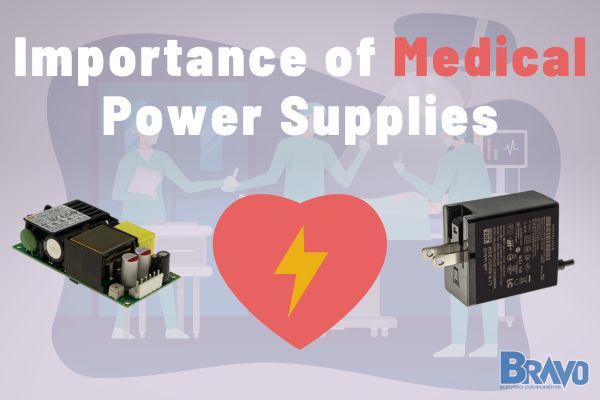
The stakes are high in the medical field, where a moment of downtime or a slight miscalculation can be the difference between life and death. But why is a medical power supply important?
Imagine the catastrophic consequences of a power failure in the middle of a critical surgery or during the operation of life-support machines.
This is why choosing a dependable medical power supply is so important, and why healthcare facilities and equipment manufacturers source their PSUs at Bravo Electro.
We’ve sourced the most reliable equipment from the most trusted power supply manufacturers in the industry. They’re equipped with the latest safeties so you can enjoy peace of mind knowing your operation is protected. You can even count on us to help you choose the right types of power supply!
Get in touch today or read below to learn more about the importance of medical power supplies.
Why is Medical Power Supply Important?
So, why is medical power supply important? Because the margin for error is slim to none in medical situations. These devices must offer unparalleled reliability, safety and compliance - but there are also operational cost considerations at play.
Safety and Reliability
Medical PSUs are designed to deliver clean, stable power to sensitive medical equipment, minimizing the risk of malfunctions or failures.
Common devices that rely on these power sources include ventilators, infusion pumps, and diagnostic machines. Any power fluctuation can lead to incorrect readings or device failures, and in turn, life-threatening situations.
These power supplies are often equipped with features like low leakage current and isolation to prevent electrical shocks, which are critical for patient safety as well.
Compliance with Regulatory Standards
It’s not just a matter of keeping your devices and equipment running smoothly - it’s a matter of keeping your operation open and avoiding legal trouble.
Medical power supplies must comply with stringent regulatory standards to ensure they meet the necessary safety and performance requirements. Certifications such as UL60601 and IEC60601 are the standard for medical-grade power supplies.
These ensure the power supplies are safe for use in medical environments, providing protection against electrical hazards, electromagnetic interference, and other potential risks.
By choosing devices with these power supply ratings you can rest assured they’ve undergone rigorous testing and validation processes and will provide reliable, consistent performance.
Operational Cost Considerations
Safety and compliance are the top priorities, but budget plays a part in sourcing your power supplies as well. So why is medical power supply important from a cost perspective?
While these power supplies may be more expensive, their reliability and efficiency can lead to long-term savings. Reliable power supplies reduce the risk of equipment failure, which can be costly in terms of power supply replacement, power supply repair, and downtime.
There’s also the concept of power supply efficiency. These medical-grade devices are designed to reduce the overall power consumption of medical devices. Translation - lower operating costs. You may end up saving money from the energy savings alone in the long run.
What to Look for in a Medical-Grade Power Supply
You know why medical power supplies are important. The question now is - what power supply do I need?
There’s a lot that goes into choosing a power supply, and it’s easy to get overwhelmed when it comes to medical-grade PSUs specifically given all the different safeties and the high stakes. That’s why we encourage you to simply reach out for one-on-one assistance making the perfect pick so you can enjoy peace of mind. We’ll get you taken care of. In the meantime, here are some things to keep in mind.
Different Types of Power Supplies
From understanding the difference between an AC vs DC power supply to accounting for unique variations in design, having a thorough grasp on the different types of medical-grade power supplies at your disposal is an essential first step.
An AC DC power supply converts alternating current (AC) from the mains into direct current (DC) to power medical devices. They’re essential for providing a stable and reliable power source for equipment such as MRI machines, X-ray systems, and patient monitors.
In contrast, a DC DC converter takes one DC voltage and steps it up or down to provide precise power regulation for sensitive medical equipment. They’re often used in portable medical devices and applications that need multiple voltage levels from a single DC source.
We have a variety of resources covering the different types of DC to DC converters and AC DC power supplies, like modular vs non modular PSU, battery charger vs power supply, linear vs switching power supply, regulated vs unregulated power supply, and more.
You can also browse the most popular styles we have in our catalog, including:
Certifications and Safeties
Perhaps most important is ensuring the PSU you choose aligns with your unique needs from a safety certification point of view. Always default to the requirements for your specific facility, but here are some of the most important ratings and considerations:
- IEC60601-1: This international standard specifies the general requirements for basic safety and essential performance of medical electrical equipment.
- UL60601-1: A similar standard specific to the United States, ensuring the power supply meets the necessary safety requirements.
- Low Leakage Current: This helps prevent electrical shocks to patients and operators. Medical PSUs typically have very low leakage currents.
- Isolation: Necessary to protect patients and sensitive electronics from electrical faults.
Other important safeties include overvoltage protection and short circuit protection. We have a complete guide covering all the different power supply certifications if you’d like to learn more.
Ensuring Specification Compatibility
Matching the power supply specifications with the medical device requirements is typically the easiest part of picking your PSU, but it’s still worth mentioning. Here are the most important specs:
- Voltage and Current Requirements: The most common voltages are 12 volt DC power supply, 24 volt DC power supply, and 48 volt DC power supply. Make sure the unit matches your device’s current levels too.
- Power Output: Learn how to check PSU wattage to confirm it can handle the total wattage required by all connected devices.
- Efficiency: This reduces heat generation and power consumption, which is particularly important in tightly packed medical equipment.
You should account for the environment your equipment or devices will live in as well to make sure the temperature aligns with the safe operating range of your PSU. Determine if it needs protection against moisture as well.
Connection Styles
Consider the power supply connector types as well to make sure you can actually power your device properly. Common styles include:
- DIN Rail Mount: Simplifies installation and maintenance with a standard rail size (TS-35/7.5 or TS-35/15), ideal for industrial control panels.
- Molex Connectors: Provides secure and compact connections, ensuring reliable and easy assembly for medical devices.
- Terminal Blocks: Offers versatile and robust connections with screw-in terminals, suitable for accommodating various wire sizes and types.
You can learn more about how to hookup DIN rail power supply or how to connect a power supply to a terminal block in our blog.
Still Need Help Choosing Your Medical PSU?
Hopefully, you have a better idea of which medical-grade power supply is right for you after reading along. But if not, remember that help is just a click or call away. You don’t need to play the guessing game, let us give you a personalized recommendation!
Enjoy Peace of Mind Powering Your Devices With the Most Dependable Medical Power Supplies at Bravo Electro!
Bravo Electro is the industry’s trusted choice for the highest quality medical power supplies from renowned manufacturers such as MEAN WELL. This means you can enjoy peace of mind knowing you’re getting dependable, long-lasting quality.
Whether you’re looking for the best modular power supply or the best power supply for robotics, the best AC to DC converter, or anything in between, you can rest assured it’s here in our catalog. We stock over 1,000 unique products.
If you discover that an off-the-shelf option isn’t going to suffice, no problem. Our custom power supply is quick and easy. You can submit your requirements and our electrical engineers will work with you to come up with a medical-grade unit that aligns with your needs, budget, and timeline.
It all starts with a conversation, whether you have a quick question or want guidance customizing your PSU. So, what are you waiting for? Get in touch today and power your equipment or devices with the most dependable solutions available from Bravo Electro.
Final Thoughts on Why a Medical Power Supply is Important
So, why is medical power supply important? In summary, these ensure the safety, reliability, and performance of medical devices. They must meet stringent regulatory standards and provide stable, clean power to prevent device failures and protect patient safety.
When selecting a medical-grade power supply, consider its certifications, specifications compatibility, and connection styles for optimal performance and peace of mind.
Find more resources in our blog like bad PSU symptoms, troubleshooting power supply, power supply overheating, how to convert DC to AC, is household electricity AC or DC, AC to DC inverter, or the advantage of having a redundant power supply.
At this point, though, the only thing left to do if you haven’t already is find the perfect medical PSU at Bravo Electro. Don’t leave anything to chance when it comes to powering medical equipment. Leave it to the pros - reach out today for help.















